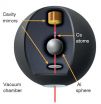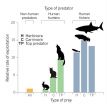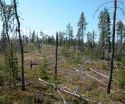(Press-News.org) Highlights
Among kidney transplant recipients, patients with mostly IgG3 donor-specific HLA antibodies had a higher likelihood of organ rejection soon after transplantation.
If rejection occurred in those with mostly IgG4 antibodies, it was usually much later after transplantation.
Washington, DC (August 20, 2015) -- The dominant antibody type present in the blood of transplant recipients may indicate their likelihood of experiencing organ rejection, according to a study appearing in an upcoming issue of the Journal of the American Society of Nephrology (JASN). The findings may help doctors identify patients who need aggressive treatments to safeguard the health of their new organ.
Transplant recipients who receive a kidney, heart, or lung often develop an immune response to the foreign tissue in the form of antibodies referred as donor-specific HLA antibodies. Some patients may already have these antibodies before their transplant because they have been exposed to blood products or previous transplants. Although the presence of donor-specific HLA antibodies in a recipient is usually not a good sign, not all patients who have them experience a poor outcome.
Through a collaboration of two transplant centers in France and the United States, Carmen Lefaucheur, MD, PhD (Saint-Louis Hospital, in Paris) and his colleagues designed a study to determine the greatest risk for losing a transplanted organ based on the characteristics and function of donor-specific HLA antibodies. Their study included 125 kidney transplant patients with donor-specific anti-HLA antibodies detected in the first year post-transplant.
The researchers found that the presence of certain donor-specific HLA antibodies--namely IgG3 and IgG4 subclasses--correlated with distinct patterns of antibody-mediated injury to the transplanted organ. Patients with mostly IgG3 donor-specific HLA antibodies had a higher likelihood of organ rejection soon after transplantation. If rejection occurred in those with mostly IgG4 antibodies, it was usually much later after transplantation.
"Our clinical investigation may help in the future to identify the patients that will require interventions to prevent the loss of a transplanted organ," said Dr. Lefaucher. "Also, based on what we learned in this investigation, more studies will be initiated to further elucidate why some patients seem to maintain good outcomes while others demonstrate accelerated deterioration of the transplanted kidney in the presence of circulating donor-specific HLA antibodies."
In an accompanying editorial, Stanley Jordan, MD (Cedars-Sinai Medical Center) noted that if the findings are supported by additional studies, they could be of great help in counseling patients and possibly avoiding costly immunotherapy to reduce what appear to be largely benign donor-specific HLA antibodies. "Lefaucheur et al. are to be commended for this important work, which further enlightens our understanding of the natural history of immunodominant donor-specific HLA antibodies and their effect on allograft pathology and outcomes," he wrote.
INFORMATION:
Study co-authors include Denis Viglietti, MD, Carol Bentlejewski ,Jean-Paul Duong van Huyen, MD, PhD, Dewi Vernerey, Olivier Aubert, MD, Jérôme Verine, MD, PhD , Xavier Jouven, MD, PhD, Christophe Legendre, MD, Denis Glotz, MD, PhD, Alexandre Loupy, MD, PhD, and Adriana Zeevi, PhD.
Disclosures: One Lamda donated regents but was not otherwise involved in either the conduct of the study or the preparation of the manuscript.
The article, entitled "Immunoglobulin G Donor-specific anti-HLA Antibody Subclasses and Kidney Allograft Antibody-mediated Injury," will appear online at http://jasn.asnjournals.org/ on August 20, 2015.
The editorial, entitled "Donor-Specific HLA Antibody IgG Subclasses Are Associated with Phenotypes of Antibody-Mediated Rejection in Sensitized Renal Allograft Recipients," will appear online at http://jasn.asnjournals.org/ on August 20, 2015.
The content of this article does not reflect the views or opinions of The American Society of Nephrology (ASN). Responsibility for the information and views expressed therein lies entirely with the author(s). ASN does not offer medical advice. All content in ASN publications is for informational purposes only, and is not intended to cover all possible uses, directions, precautions, drug interactions, or adverse effects. This content should not be used during a medical emergency or for the diagnosis or treatment of any medical condition. Please consult your doctor or other qualified health care provider if you have any questions about a medical condition, or before taking any drug, changing your diet or commencing or discontinuing any course of treatment. Do not ignore or delay obtaining professional medical advice because of information accessed through ASN. Call 911 or your doctor for all medical emergencies.
Founded in 1966, and with more than 15,000 members, the American Society of Nephrology (ASN) leads the fight against kidney disease by educating health professionals, sharing new knowledge, advancing research, and advocating the highest quality care for patients.
DALLAS, Aug. 20, 2015 -- Caregiver spouses of stroke survivors are at an increased risk of mental and physical health issues that may continue for years, according to research in the American Heart Association journal Stroke.
Swedish researchers evaluated 248 stroke survivors, below age 70 (average mid-sixties), and their spouses at stroke onset and compared the results with 245 non-stroke controls for seven years after the stroke event.
At the seven-year follow-up, 16.5 percent of survivors had suffered a recurrent stroke. Spouses of survivors reported lower scores ...
Boston, MA -- A widely used class of industrial chemicals linked with cancer and interference with immune function--perfluorinated alkylate substances, or PFASs--appears to build up in infants by 20%-30% for each month they're breastfed, according to a new study co-authored by experts from Harvard T.H. Chan School of Public Health. It is the first study to show the extent to which PFASs are transferred to babies through breast milk, and to quantify their levels over time.
"We knew that small amounts of PFAS can occur in breast milk, but our serial blood analyses now show ...
In-depth interviews conducted by researchers at the Johns Hopkins University School of Medicine of 20 young women attending an urban sexually transmitted disease clinic have documented a variety of unexpected, unintended sexual encounters linked to their alcohol use before sex occurs.
Links between alcohol use and risky or deleterious sexual encounters are not necessarily new, say investigators, but this small study identifies very specifically the disconnect between what young women have in mind when they drink and have sex and what really happens.
"The idea behind ...
According to a survey conducted by Rhode Island Hospital researchers, there is significant variability regarding how clinicians manage catheters placed in the arteries of patients in intensive care units. Some practices may increase risk of infection associated with these catheters. Fewer than half of those surveyed complied with current Centers for Disease Control and Prevention (CDC) infection prevention guidelines for arterial catheter insertions. The study was published today in Critical Care Medicine.
"Barrier precautions are employed inconsistently by critical care ...
Washington, DC - August 20, 2015 - Swedish exchange students who studied in India and in central Africa returned from their sojourns with an increased diversity of antibiotic resistance genes in their gut microbiomes. The research is published 10 August in Antimicrobial Agents and Chemotherapy, a journal of the American Society for Microbiology.
In the study, the investigators found a 2.6-fold increase in genes encoding resistance to sulfonamide, a 7.7-fold increase in trimethoprim resistance genes, and a 2.6-fold increase in resistance to beta-lactams, all of this without ...
PHOENIX, Ariz. -- Aug. 20, 2015 -- A study by the Translational Genomics Research Institute (TGen) and other major research institutes, found a new set of genes that can indicate improved survival after surgery for patients with pancreatic cancer. The study also showed that detection of circulating tumor DNA in the blood could provide an early indication of tumor recurrence.
In conjunction with the Stand Up To Cancer (SU2C) Pancreatic Cancer Dream Team, the study was published in the prestigious scientific journal Nature Communications.
Using whole-exome sequencing ...
If dark energy is hiding in our midst in the form of hypothetical particles called "chameleons," Holger Müller and his team at the University of California, Berkeley, plan to flush them out.
The results of an experiment reported in this week's issue of Science narrows the search for chameleons a thousand times compared to previous tests, and Müller, an assistant professor of physics, hopes that his next experiment will either expose chameleons or similar ultralight particles as the real dark energy, or prove they were a will-o'-the-wisp after all.
Dark energy ...
Management of boreal forests needs greater attention from international policy, argued forestry experts from the International Institute for Applied Systems Analysis (IIASA), Natural Resources Canada, and the University of Helsinki in Finland in a new article published this week in the journal Science. The article, which reviews recent research in the field, is part of a special issue on forests released in advance of the World Forestry Congress in September.
"Boreal forests have the potential to hit a tipping point this century," says IIASA Ecosystems Services and Management ...
This news release is available in Japanese.
Humans are just one of many predators in this world, but a new study highlights how their intense tendency to target and kill adult prey, as well as other carnivores, sets them distinctly apart from other predators. As humans kill other species in their reproductive prime, there can be profound implications -- including widespread extinction and restructuring of food webs and ecosystems--in both terrestrial and marine systems. To evaluate the nature of human predation compared to nonhuman predation, Chris Darimont et al. conducted ...
This news release is available in Japanese.
In this special issue, the editors of Science invite experts to provide closer looks at how natural and human-induced environmental changes are affecting forests around the world, from the luscious, diverse forests of the tropics, to the pristine, resilient boreal forests of the north. The special issue is complemented by a package from Science's news department.
Amid extreme environmental and climate changes, Susan Trumbore and colleagues highlight the urgency of monitoring forest health, especially ...


